John Deere vs Massey Ferguson – Who Makes The Better Mowers?
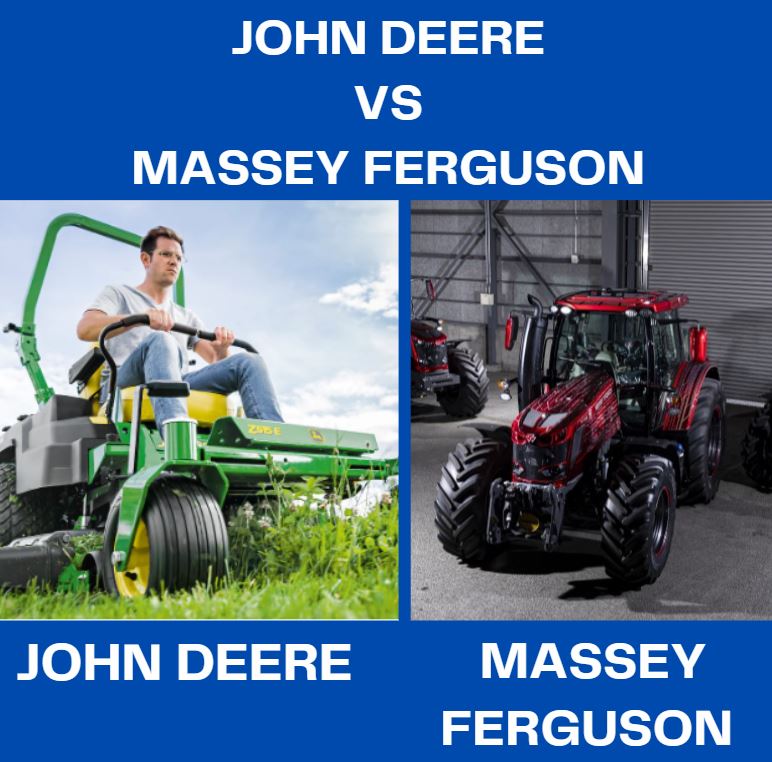
John Deere and Massey Ferguson are two of the most renowned and trusted manufacturers of lawn mowers and other outdoor equipment in the United States.
Both companies have iconic mowers that anyone in the agricultural, farming or groundskeeping industry will instantly recognize.
And while all this prestige is great for the individual companies, it presents a bit of a conundrum for consumers.
Because when you’re in the market for a new mower, you may have a very hard time choosing between the two brands.
But it helps to have a side-by-side comparison of the brands and some of their most popular mower models. And that’s exactly what we have for you today.
If you are deciding between a John Deere and Massey ferguson mower, then be sure to pore over the following brand comparison article.
John Deere Overview & History
The John Deere legacy began all the way back in 1837 when John Deere himself began making simple farming equipment out of a small shop.
The equipment got more and more complex until John Deere became the iconic brand we know today.
Even people who aren’t in the agricultural industry can instantly recognize the company’s trademark green mowers with the stag logo.
Today, John Deere makes heavy-duty forestry equipment and consumer-level mowers and outdoor equipment.
Massey Ferguson Overview & History
The Massey Ferguson story doesn’t go as far back as John Deere’s but the company is still very well-known.
The company was founded in the United Stated in 1952 when the Massey Harris and Ferguson companies merged.
Since then, the Massey Ferguson company has been producing mowers and other lawn equipment that many say are very similar in quality to John Deere – some even say they produce better mowers.
Recently, the Massey Ferguson company was recognized as the manufacturers of the 3rd most reliable tractors and mowers in North America.
What is Each Company Known for?
One of the reasons that the legacy of John Deere is so undeniable is that the company is credited with the invention of the steel plow.
Not only are they known for having invented arguably the most important farming tool of the last two centuries, they continue to innovate with modern mowers that meet the needs of both private residents and professional outdoorsmen.
The Massey Ferguson company is known for pioneering oil engines such as the Wallis tractor that debuted in the 1920’s. Today, the company is known as one of the most reliable brands when it comes to tractors and mowers.
They are also known for making a wide variety of farming equipment including hay tools, utility tractors, self-propelled sprayers, combine harvesting equipment and planting equipment.
Massey Ferguson 1526 vs John Deere 2025r
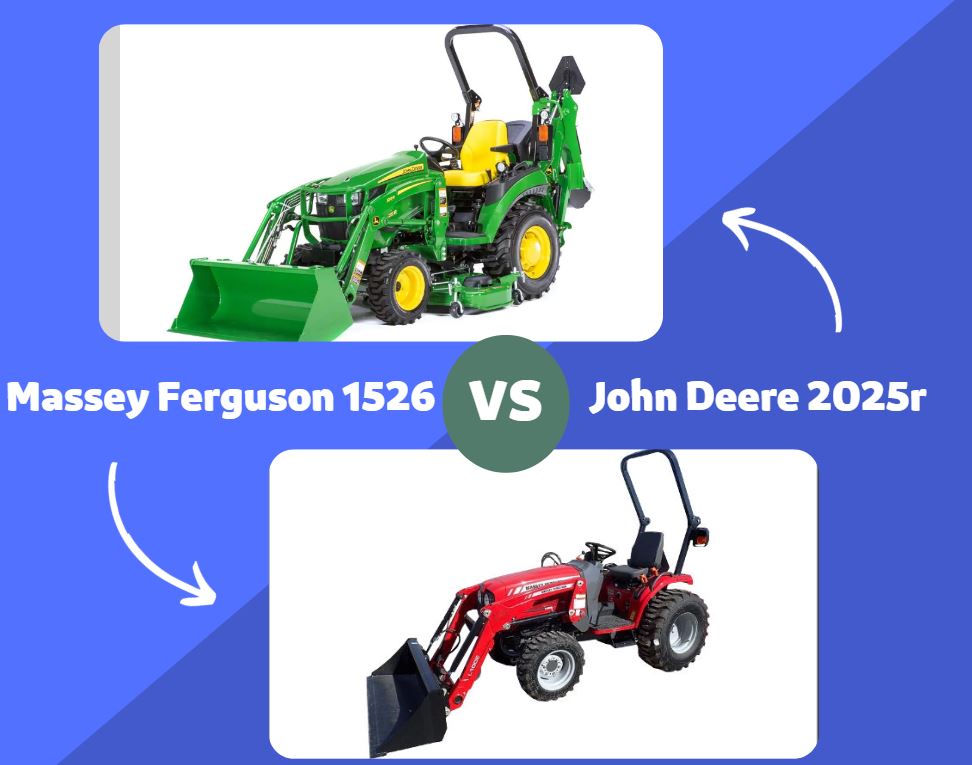
Massey Ferguson Quick Facts:
- 3-cylinder engine
- Compact Tractor
John Deere Quick Facts:
- Compact tractor
- 23HP engine
Both of these are compact tractors. Both tractors also feature hydrostatic transmissions as well.
The John Deere 2025r features a 3-cylinder diesel engine which is similar in size to the Massey Ferguson 1526.
The John Deere 2025r engine produces 23 horsepower and a cruise control setting. The front loader of the 1526 was a bit easier to switch out with easy connecting hydraulic lines.
The 1526 was also more comfortable to operate.
John Deere Pros & Cons
Pros:
- Good power
- Cruise control
Cons
- Not as comfortable
Overall Score: 98/100
Check Out More Reviews Here:
Massey Ferguson Pros & Cons
Pros:
- More comfortable
- Hydrostatic transmission
Cons
- No cruise control
Overall Score: 96/100
Check Out More Reviews Here:
John Deere 1025r vs Massey Ferguson 1725
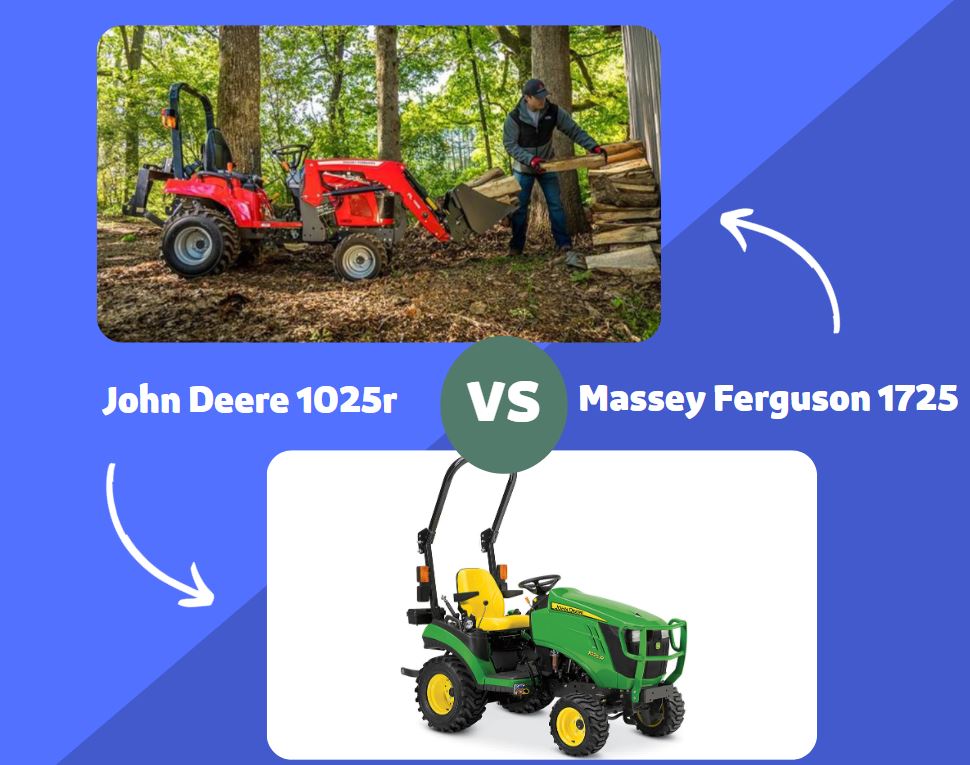
John Deere Quick Facts:
- Sub-compact type
- 4-wheel drive
Massey Ferguson Quick Facts:
- Skid steer bucket
- Front-end loader
The John Deere 1025r is a sub-compact tractor that features a mid-mower deck that is very easy to remove and reattach.
This is a tractor with 4-wheel drive and power steering so it maneuvers like a dream. It sports a 23 horsepower engine and a hydrostatic transmission.
We feel that the John Deere 1025r would be a good choice for anyone who needs a tractor that is easy to operate. If this is your first time buying or using a sub-compact tractor, you may have a better time with the intuitive controls of the 1025r.
The Massey Ferguson 1725 is similar in most respects. However, unlike the John Deere 1025r, the Massey Ferguson 1725 has a skid steer bucket. It also had slightly better lifting capacity than the 1025r.
However, the Massey Ferguson 1725 was not as comfortable to operate as the 1025r. The 1725 would be a good choice if you deal with lumber often.
John Deere Pros & Cons
Pros:
- Easy to operate
- Intuitive controls
Cons
- No skid steer
Overall Score: 96/100
Check Out More Reviews Here:
Massey Ferguson Pros & Cons
Pros:
- Great lifting capacity
- Easy to operate loader and tractor at the same time
Cons
- Pricey
Overall Score: 96/100
Check Out More Reviews Here:
Massey Ferguson 4710 vs John Deere 5100e
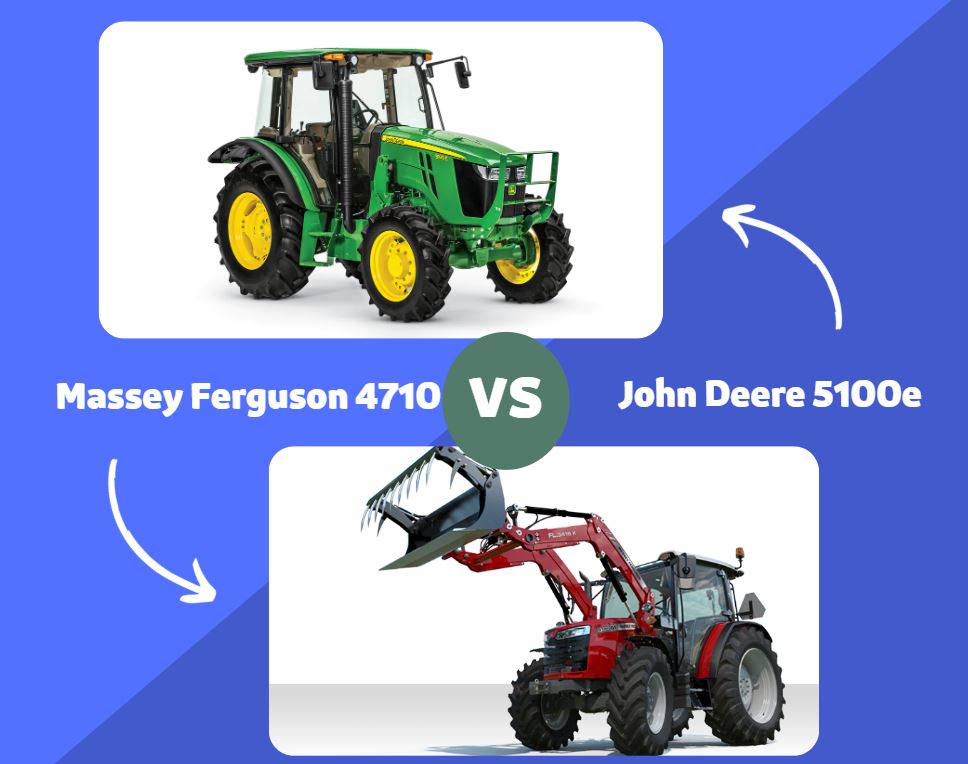
John Deere Quick Facts:
- 12 reverse speeds
- LED instrument cluster
Massey Ferguson Quick Facts:
- Electro-hydraulic wet disc
- 3-cylinder engine
Both of these tractors have 12 speeds and both have 100 HP engines. However, we found that the 5100e had better torque than the Massey Ferguson 4710.
The increased torque made it easier to get over tough terrain and tight spots. The Massey Ferguson 4710 also has a 3-cylinder engine while the John Deere 5100e has a 4-cylinder engine.
Overall, the John Deere 5100e was more powerful and more capable in adverse terrain and weather conditions.
However, the Massey Ferguson 4710 had better lifting capacity which seems to be the hallmark of their tractors when compared to John Deere models.
The Massey Ferguson 4710 would be better for anyone who tends to lift logs and other heavy materials while the John Deere 5100e would be a good choice for anyone who normally deals with rugged terrain.
The John Deere 51002 can be outfitted with a chainsaw holder, chain box, clamp kit, long tool holder and a handheld leaf blower holder.
It’s very versatile and it gives you better top speeds than the Massey Ferguson 4710.
The Massey Ferguson 4710 offers 2-wheel and 4-wheel drive so even despite its inferior torque, it can get you around in most conditions. The controls can be a bit tricky so it may take some time to get used to them.
John Deere Pros & Cons
Pros:
- Better for tough terrain
- Modern operator controls
Cons
- Lower lifting capacity
Overall Score: 95/100
Check Out More Reviews Here:
Massey Ferguson Pros & Cons
Pros:
- Great for commercial use
- Durable design
Cons
- Transmission is not as smooth as the 5100e
Overall Score: 94/100
Check Out More Reviews Here:
What Does John Deere Do Better?
From our experience with John Deere tractors, we know that they tend to have better transmission operation.
The transmissions just seem to be more reliable and operate smoother. Some of the models that we tested for this particular comparison also had more torque than comparable Massey Ferguson models.
What Does Massey Ferguson Do Better?
It was very clear that Massey Ferguson put more emphasis on lifting power for their compact and subcompact tractors.
For example, the rear lift capacity of the Massey Ferguson 4710 is 4580 pounds. While John Deere tractors offered comparable lifting power, Massey Ferguson models outperformed JD tractors 9 times out of 10.
Which Brand is Better Priced?
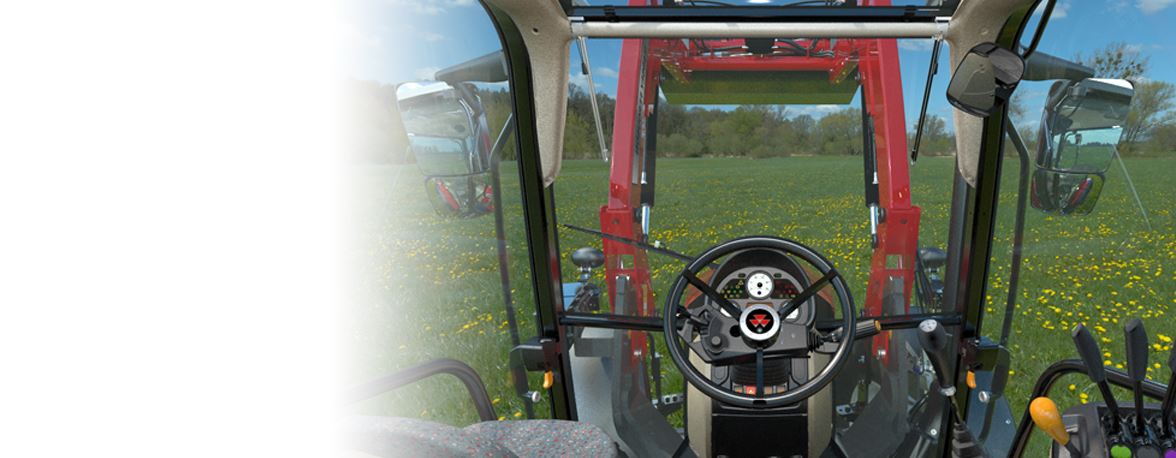
Massey Ferguson tends to sell their tractors slightly cheaper than John Deere does.
While it varies from model to model and retailer to retailer, you can expect John Deere tractors to be 1-3 thousand dollars more expensive than comparable Massey Ferguson tractors.
Which Brand Cuts Better?
What we really liked about John Deere tractors and mowers was that most of them come with triple-blade cutting decks that produce a clean, uniform cut. We also like the fact that they almost never have to be replaced or sharpened.
While Massey Ferguson cutting decks feature sharp blades, they get dull faster than John Deere mowers. In general, John Deere tractors and mowers will provide you with better cutting power for longer periods of time.
Which Controls and Handles Better?
At first we were inclined to rule this one a tie. That’s because most John Deere and Massey Ferguson models have almost identical transmissions.
However, the more we thought about it the more we realized that John Deere tractors have the edge. What hurts Massey Ferguson tractors is that some of them lack power steering.
Most Massey Ferguson tractors also don’t have as much torque as comparable John Deere models.
Furthermore, we realized that John Deere tractors have more modern, well-lit and intuitive controls. While both companies offer smooth maneuvering and handling,
John Deere edges John Massey with more torque, power steering and more intuitive controls.
Which Brand is More Reliable?
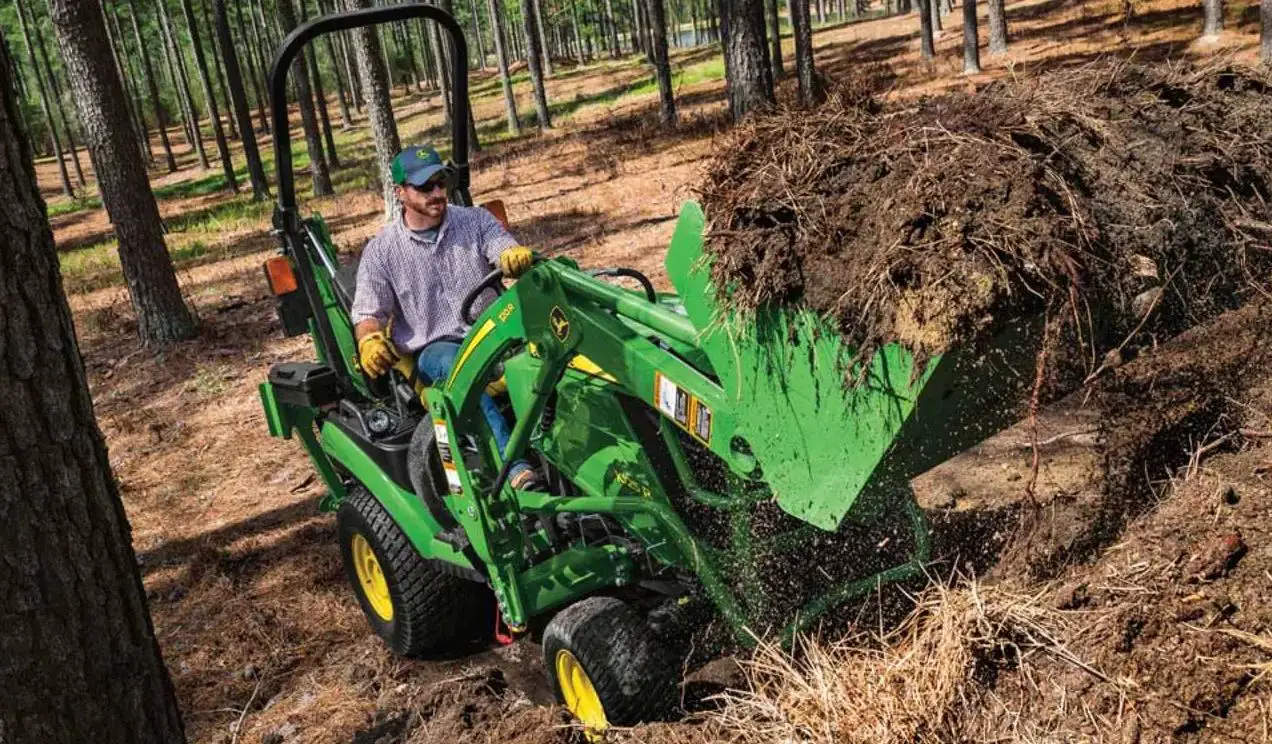
For this, it helps to look at the transmissions as the transmission is usually a good indicator of overall reliability.
The Dyna-VT transmission by Massey Ferguson is often hailed as one of the most reliable transmissions in the industry. That’s likely due to the fact that the Dyna-VT transmission has fewer moving parts than comparable transmissions.
Fewer moving parts means fewer chances of failure.
It should also be noted that Massey Ferguson has been named the manufacturer of the 3rd most reliable tractors in North America.
The automated transmission that John Deere uses in many of its tractors allows for fast gear changes; but they tend to have more issues than Massey Ferguson transmissions.
And even while John Deere has been hailed as the most reliable manufacturer of tractors, we are inclined to give this one to Massey Ferguson.
Which Brand Lasts Longer?
This is a very tough one to call because how long your tractor or mower lasts has a lot to do with what it’s used for and how it’s maintained.
Both manufacturers are known for making rugged tractors that last a very long time. However, if we had to make a final decision based on our testing and experience, we feel that Massey Ferguson tractors would actually last longer.
They have very solid builds in terms of chassis, suspension and front-loader construction.
And the fact that they feature more reliable transmissions means that you probably won’t have to replace them as soon as you would with a John Deere tractor.
Who Should Buy John Deere?
What we liked about the John Deere tractors that we tested is that they just felt more modern in the operator seat.
From LED lighting to intuitive controls, we almost felt that John Deere tractors were luxury vehicles. And since they are easier to operate overall, we would say that they would be better for people with limited experience with tractors and riding mowers.
They would also be a good choice for anyone who deals with rugged terrain because they tend to have more torque than Massey Ferguson models.
Who Should Buy Massey Ferguson?
Massey Ferguson excels at making durable tractors with ample lifting power.
While they may be harder to master – especially for someone with limited experience with these machines – they tend to be better suited for larger jobs.
For these reasons we would say that Massey Ferguson tractors would be great for anyone who needs superior lifting power and is concerned about the longevity of their outdoors equipment.
Final Assessment
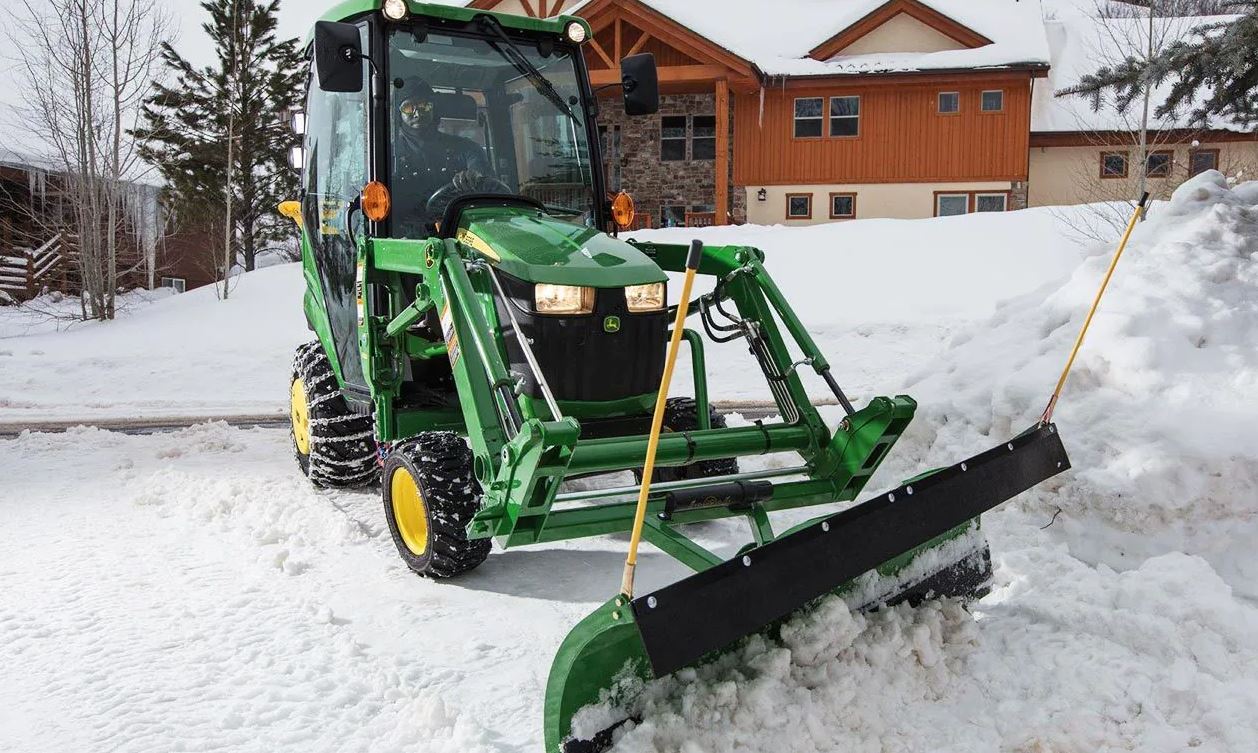
We were actually a bit surprised when we compared these tractors side-by-side.
Most of us thought that John Deere was going to come out on top. But by the end of testing, most of us were inclined to say that Massey Ferguson actually makes the better tractors.
Not only do they make tractors that have better lifting capacity; they typically sell for a lower price than comparable John Deere tractors.
The Dyna-VT transmission they use for their tractors is also regarded as the best in the business – and it’s hard to argue against transmission reliability.
However, the consumer should be aware that for uneven terrain, tense tree grouping and properties that have not been maintained, John Deere may actually be a better choice.
In the end though, we can see Massey Ferguson tractors being more reliable and more useful for a broader range of applications.



